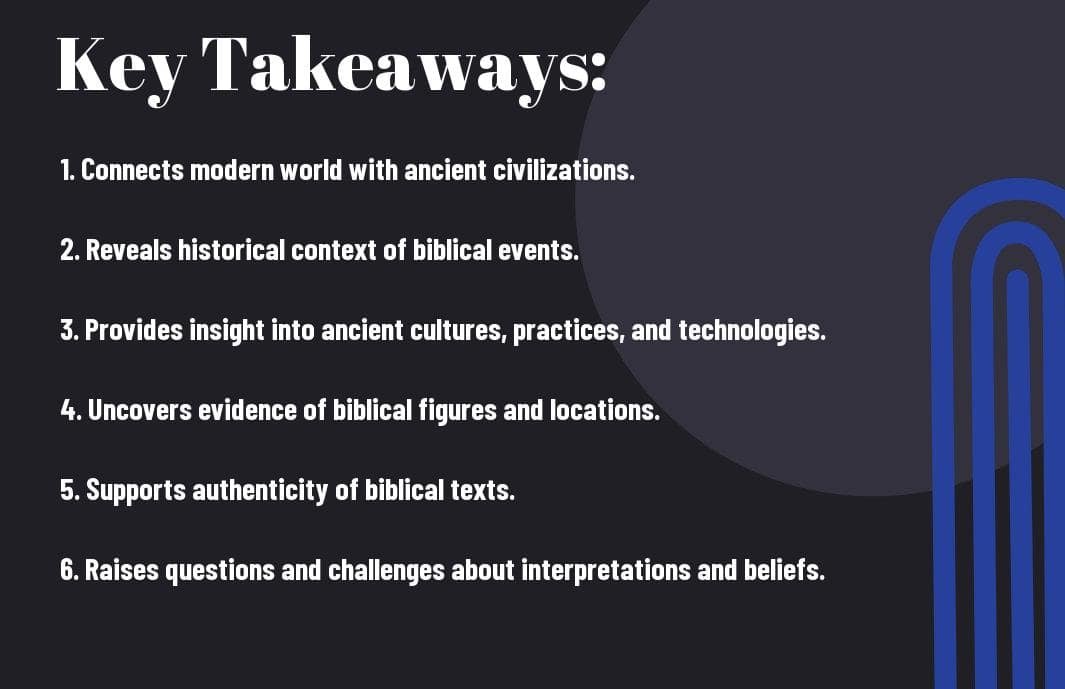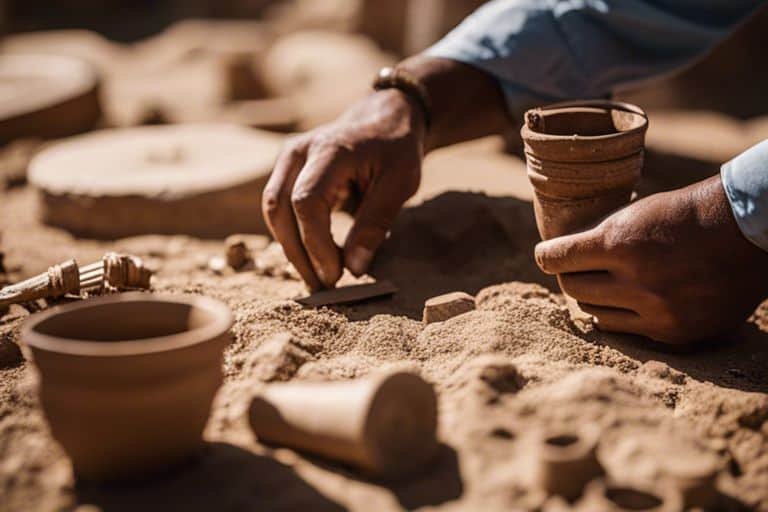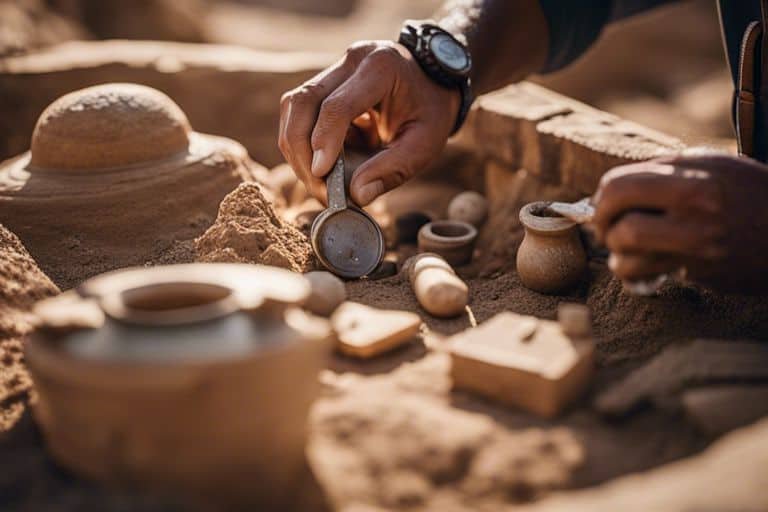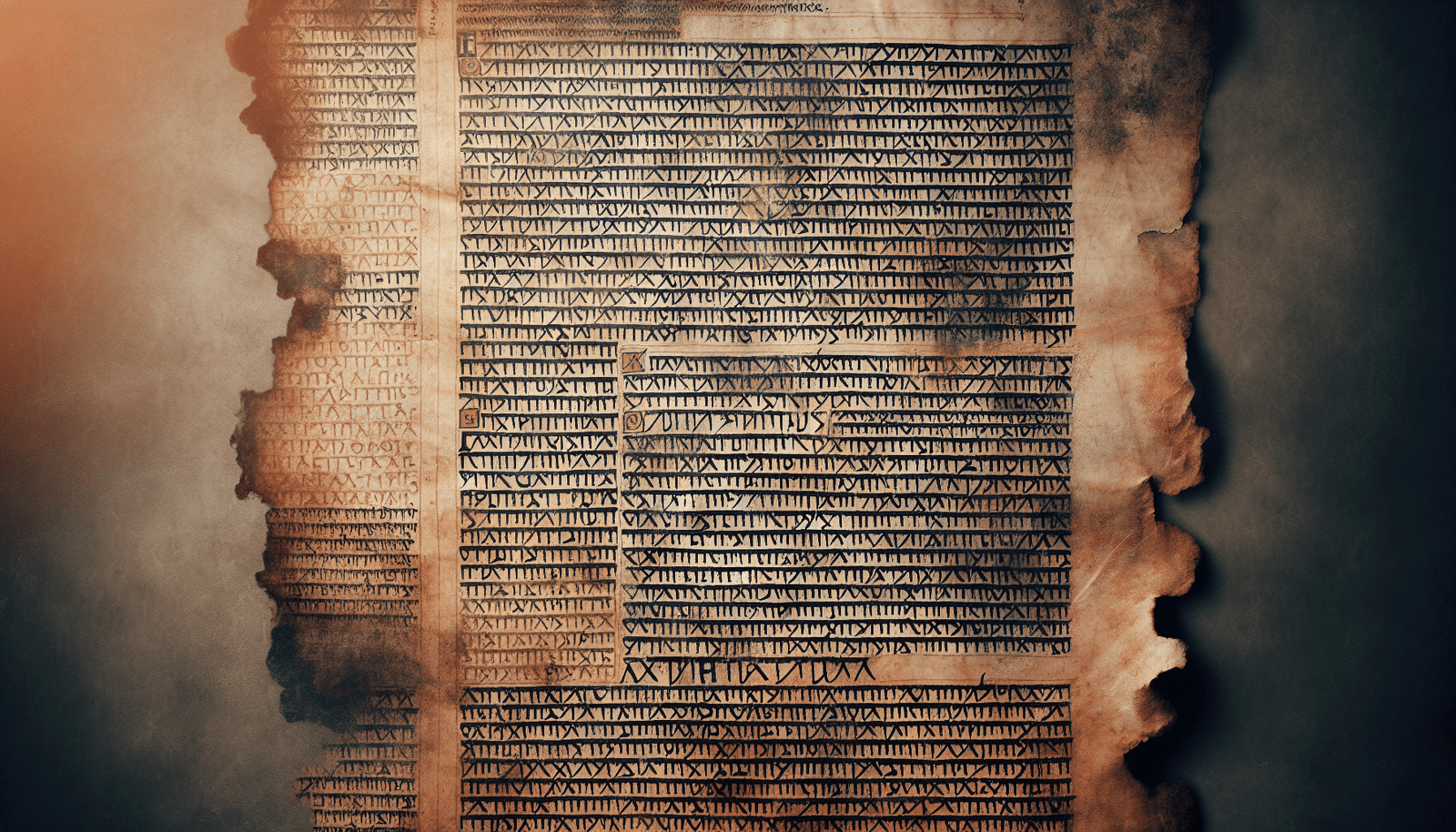Artifacts unearthed through Biblical archaeology offer a captivating glimpse into ancient history, shedding light on the mysteries of the past. From ancient scrolls to monumental ruins, each discovery holds the potential to rewrite our understanding of biblical events and figures. Delving into the depths of history, these remarkable findings not only provide insights into ancient civilizations but also validate the existence of biblical narratives. To explore further into this fascinating world of discovery, check out Biblical Archaeology’s Top 10 Discoveries of 2023 revealing the latest breakthroughs in the field.
Key Takeaways:
- Biblical Archaeology Unveils History: Biblical archaeology helps uncover ancient artifacts and sites mentioned in the Bible, shedding light on historical events and figures.
- Insights into Ancient Civilizations: By studying artifacts and ruins, biblical archaeology provides valuable insights into the daily life, culture, and practices of ancient civilizations.
- Confirmation of Biblical Narratives: Discoveries through biblical archaeology often provide concrete evidence that aligns with the accounts and narratives found in the Bible, further validating its historical authenticity.

The Role of Archaeology in Understanding the Biblical World
Tools and Techniques in Biblical Archaeology
Some of the most valuable tools and techniques used in Biblical archaeology include ground-penetrating radar, drone technology, and isotopic analysis. These modern advancements help archaeologists uncover buried structures, map ancient sites with precision, and even determine the diets of ancient peoples.
Key Archaeological Sites Linked to the Bible
One of the most significant archaeological sites linked to the Bible is Jerusalem, the ancient and modern capital of Israel. Other key sites include Megiddo, the site of Armageddon mentioned in the Book of Revelation, and Qumran, where the Dead Sea Scrolls were discovered.
Sites like Jericho, where the city walls famously came tumbling down, and Masada, where Jewish rebels made their last stand against Roman forces, provide invaluable insights into the historical events and people described in the Bible.

Deciphering Ancient Artifacts
The Process of Dating and Analysis
All archaeological work begins with an imperative step – dating and analysis. Any artifact found during excavations is subjected to rigorous processes to determine its age and composition. Through techniques such as carbon dating, thermoluminescence, and stratigraphy, experts can place these artifacts within a specific historical context. This process is instrumental in unlocking the mysteries of ancient civilizations and shedding light on their practices and beliefs.
Artifacts That Changed Our Understanding of the Bible
Dating back thousands of years, archaeological discoveries have played a pivotal role in shaping our understanding of the Bible. These artifacts have not only validated historical accounts but have also challenged preconceived notions, prompting scholars to reassess their interpretations of biblical events. From the Dead Sea Scrolls to the Tel Dan Stele, these findings provide invaluable insights into the religious, cultural, and social landscapes of the ancient world.
Process: The uncovering of these artifacts is a meticulous and arduous process, requiring patience, expertise, and meticulous attention to detail. These discoveries not only enrich our understanding of the past but also spark new discussions and debates among experts in the field.

Controversies and Debates in Biblical Archaeology
Many archaeological discoveries have shed light on the historical context of events and figures mentioned in the Bible. However, these findings have often sparked debates and controversies among scholars and historians. One notable source of debate is The Bible Unearthed, a book that challenges traditional views on biblical history and archaeology.
The Debate over Biblical Historicity
For centuries, scholars have debated the historicity of events and individuals described in the Bible. Some argue that archaeological evidence corroborates biblical accounts, while others suggest that certain stories are more allegorical than historical. This ongoing debate has fueled research and excavation efforts in the field of biblical archaeology.
Political and Religious Implications of Archaeological Findings
Political and religious implications often accompany archaeological findings related to biblical history. The discovery of artifacts or sites that support or contradict biblical narratives can have significant implications on religious beliefs and political agendas. Scholars and religious leaders may interpret these findings differently, leading to conflicts over the meaning and significance of archaeological evidence.
The Future of Biblical Archaeology
Technological Advances and Their Impact
After years of traditional excavation methods, the future of Biblical archaeology is being shaped by exciting technological advances. An array of tools such as LiDAR (Light Detection and Ranging), ground-penetrating radar, and 3D scanning are revolutionizing the way archaeological sites are surveyed and excavated, allowing researchers to uncover and preserve ancient artifacts with unprecedented precision and efficiency.
The Importance of Ethical Considerations
After decades of sometimes controversial practices in the field of Biblical archaeology, there is a growing recognition of the necessary ethical considerations that must guide archaeological work. Archaeologists must ethically engage with local communities, respect the sacred significance of religious sites, and ensure the responsible stewardship of cultural heritage.
Plus, it is imperative to address issues such as looting, the illicit antiquities trade, and the potential exploitation of archaeological discoveries for personal gain. By integrating strong ethical standards into every stage of the archaeological process, researchers can uphold the integrity of their work and preserve the authenticity of ancient artifacts for future generations.
Summing up
As a reminder, Biblical archaeology provides a fascinating window into the ancient world, uncovering artifacts that shed new light on the events and people of the Bible. Through meticulous excavation and analysis, researchers are able to piece together the puzzle of history and draw connections between archaeological finds and biblical texts. The discoveries made through Biblical archaeology not only enrich our understanding of the past but also highlight the enduring significance of the ancient stories and traditions that continue to shape our world today.
FAQ
Q: What is Biblical Archaeology?
A: Biblical Archaeology is a field of study that focuses on excavating and studying ancient artifacts and structures mentioned in the Bible to better understand the historical and cultural context of the biblical narratives.
Q: What kind of artifacts are typically found in Biblical Archaeology?
A: Artifacts found in Biblical Archaeology include pottery, coins, inscriptions, tools, weapons, jewelry, and architectural remains such as walls, gates, and temples that provide insights into ancient civilizations mentioned in the Bible.
Q: Why is Biblical Archaeology important?
A: Biblical Archaeology is important because it helps to corroborate the historical accuracy of the Bible, provides insights into ancient cultures and practices, and sheds light on the context in which biblical events took place.
Q: What secrets can Biblical Archaeology reveal?
A: Biblical Archaeology can reveal details about daily life, trade routes, religious practices, social structures, architecture, and political dynamics of ancient civilizations that are mentioned in the Bible, enriching our understanding of the past.
Q: How does Biblical Archaeology contribute to our knowledge of the Bible?
A: Biblical Archaeology contributes to our knowledge of the Bible by providing tangible evidence that supports the historical accuracy of biblical accounts, clarifies ambiguous passages, and offers cultural and historical context to enhance interpretation and understanding of the scriptures.



